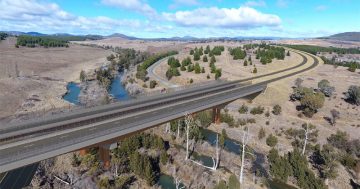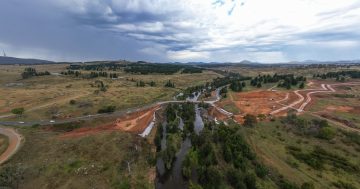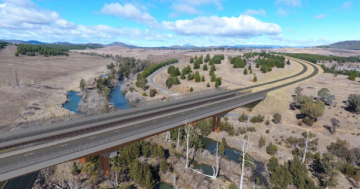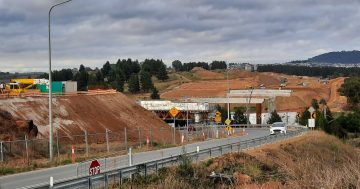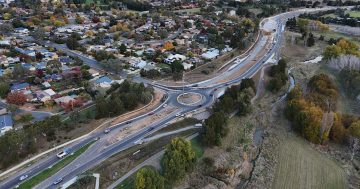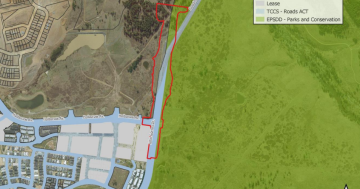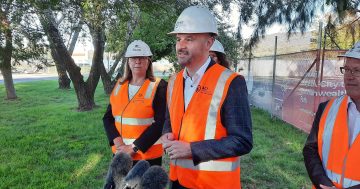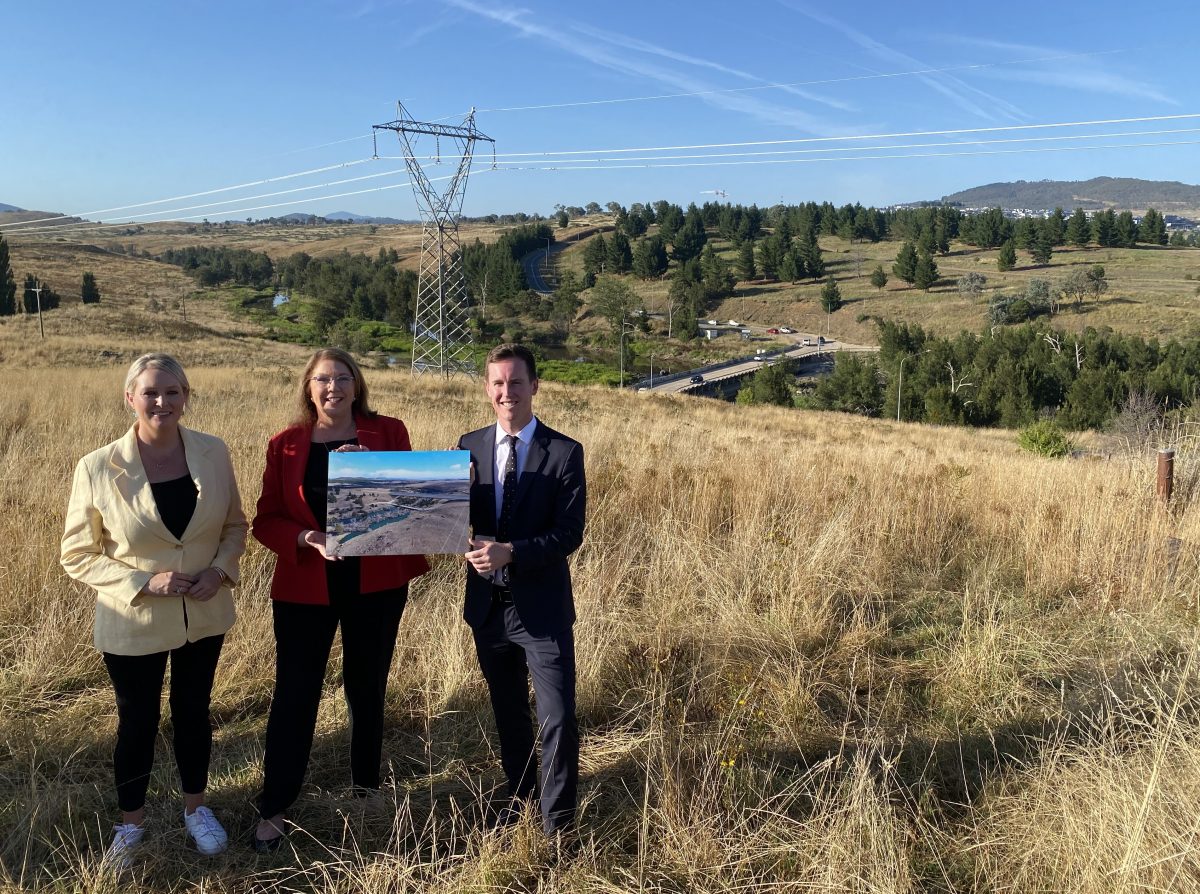
Murrumbidgee MLA Marisa Paterson, Federal Infrastructure Minister Catherine King and ACT Transport Minister Chris Steel announced the successful tenderer for the Molonglo River Bridge in February. Photo: Claire Fenwicke.
The vital Molonglo River Bridge project has received a further $25 million in Commonwealth funding as the ACT escaped almost unscathed from the Federal Government infrastructure cuts announced yesterday (16 November).
Other ACT projects to receive a funding boost were the Beltana Road Improvements ($300,000) in Pialligo and Gundaroo Drive Duplication ($1.8 million).
Projects given the all-clear include the Athllon Drive Duplication, Light Rail Stage 2A, the Monaro Highway Upgrade and William Hovell Drive Duplication.
But the $1.5 million funding for the Inner Canberra Corridor Planning Package will not proceed, the only ACT project to miss out.
The Federal Government has scrapped 50 projects across the country as part of its revamp of infrastructure spending flowing from an independent strategic review which found that the Infrastructure Investment Program inherited from the former Coalition Government was undeliverable.
Infrastructure Minister Catherine King had also flagged that the states and territories would need to carry a greater share of the cost burden than before.
The new bridge funding will match ACT Government funding announced in the Budget to cover the higher cost of building the double-lane bridge, providing a safe and reliable river crossing and linking the growing Molonglo Valley suburbs with Belconnen.
ACT Transport and City Services Minister Chris Steel said the announcement showed that the Federal Labor Government was a genuine partner working with the ACT Government to deliver the infrastructure the rapidly growing city needed.
“The funding from the Federal Government is their 50 per cent share of previously announced ACT Budget funding to cover the increased costs of labour and building materials like steel needed to build the bridge over the Molonglo River,” he said.
“While prices have increased, delivering this infrastructure is critical to connect our newest communities, support more housing and grow our economy.”
The cost pressures have been felt industry-wide across the country over the past 18 months, particularly for labour and supply of materials such as steel, used extensively in bridge building.
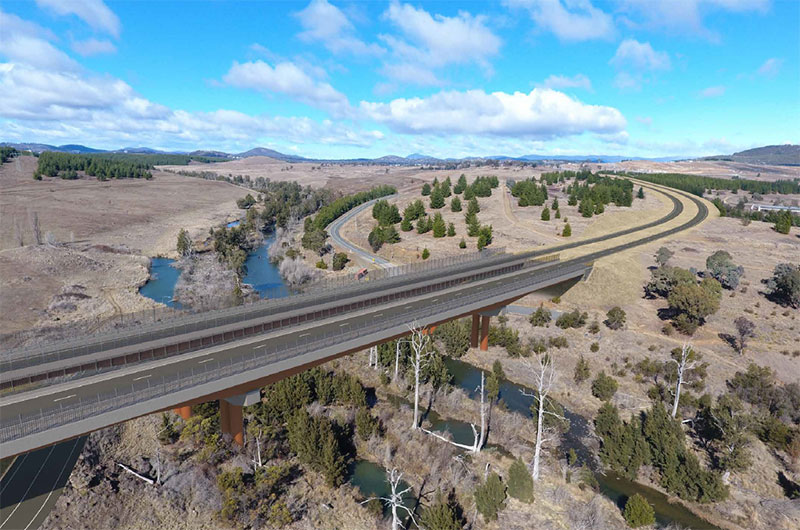
An artist’s impression of the Molonglo River Bridge, a much-needed link between Belconnen and the new Molonglo Valley suburbs. Photo: ACT Government.
The extra funding brings the total budget cost of the bridge to $226.2 million. The Commonwealth had previously committed $87.5 million to the project under the National Partnership Agreement on Land Transport Infrastructure Projects.
This was still within the $250 million figure projected in the ACT Infrastructure Plan 2019. The bridge was still expected to open in 2025
The Molonglo River Bridge will solve the reliability problem of Coppins Crossing, which suffers from flooding and cuts the Molonglo suburbs off from Belconnen, causing many to make long diversions via William Hovell Drive and the Tuggeranong Parkway.
The double-lane connection will also be much safer than the current winding, single-lane road that was the scene of a horrific triple fatality in October last year.
The relatively benign infrastructure announcement will be a relief to the ACT Government.
A spokesperson said the ACT Government continued to be in discussions with the Federal Government about the funding implications for joint infrastructure projects.
“We have made it clear to the Commonwealth that the ACT’s historic underinvestment in infrastructure projects should be recognised in any future decisions around projects in the ACT,” the spokesperson said.
The spokesperson said co-funded projects were already based on a 50-50 funding split and the ACT Government expected this to continue.
Yesterday’s announcements ensure funding for light rail stage 2A, and the ACT spokesperson said Stage 2B to Woden should be treated the same way.
“The ACT Government believes that Stage 2A and Stage 2B, along with future stages of light rail, meet the characteristics identified in the Infrastructure Policy Statement and looks forward to working collaboratively with the Commonwealth for the delivery of the network with funding to be provided on a 50-50 basis,” the spokesperson said.
The spokesperson would not rule out further funding changes or time frames for funded projects.
“The ACT Government has been progressively updating the Infrastructure Plan and will continue to do so as we balance building generational infrastructure for the fastest growing city in the country against market capacity and industry constraints,” the spokesperson said.
The federal infrastructure policy statement focused on nationally significant land transport projects.












